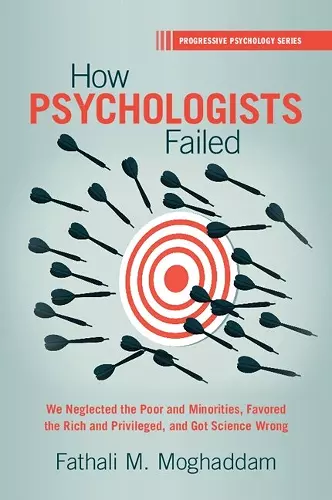How Psychologists Failed
We Neglected the Poor and Minorities, Favored the Rich and Privileged, and Got Science Wrong
Format:Paperback
Publisher:Cambridge University Press
Published:3rd Nov '22
Currently unavailable, and unfortunately no date known when it will be back
This paperback is available in another edition too:
- Hardback£69.99(9781316513019)

Psychologists must change direction, by attending to the needs of disadvantaged minorities and adopting a correct model of science.
Psychology has become a discipline with global influence, but continues to neglect the poor and minorities, and continues to adopt an incorrect model of science. This book explains what has gone wrong in psychology, and what steps need to be taken for psychology to become a constructive global force.Psychology is a discipline with global influence, but continues to neglect disadvantaged minorities and continues to adopt an incorrect model of science. This volume explains what has gone wrong, and what steps should be taken for psychology to become a constructive international force. Historically, psychologists have focused only on causal explanations of behavior, neglecting normatively regulated behavior and intentionality. By giving greater importance to context and collective processes, moving from 'societies to cells,' psychologists can better understand and explain individual behavior. Poverty is an extremely powerful context that shapes cognitions and actions, with destructive consequences for disadvantaged individuals. The advocation of 'be happy psychology' and 'resilience' as solutions to problems faced by the disadvantaged leads to entrenched group-based inequalities, with the poor stuck at the bottom. Moving forwards, this volume proposes that psychologists should focus on normative systems to ultimately foster a more balanced field of study for the future.
'In this fascinating and provocative book, Moghaddam addresses two persistent biases in mainstream psychology: reductionism and determinism. These biases function systematically to conceal and misattribute collective disadvantage, Moghaddam compellingly argues. By centering collective processes and normative contexts, psychological science will discern and challenge poverty and injustice. A great read!' Winnifred Louis, University of Queensland, Australia
'This book is an intellectual feast from an intellectual force. In compelling detail, Moghaddam shows how the context of our lives affects the way we think, feel, and behave. Our health and happiness, the way we live and die, are determined by our surroundings. We ignore the conditions of our lives at our own peril. If we want to improve our lives, relationships, workplaces, and the world, we must stop believing in the meritocratic myth. Moghaddam tells us how to stop deluding ourselves and how to start promoting wellness, fairness, and worthiness. Compulsory reading, not just for psychologists, but for everyone concerned with our collective fate.' Isaac Prilleltensky, Author of How People Matter: Why it Affects Health, Happiness, Love, Work, and Society
'In this tour de force, Moghaddam exposes the limits of individualized psychology and illuminates how economic inequity and social class affect issues such as mental health, educational performance, and injustice. This eye-opening book should be required reading for psychology students and psychologists.' Michael Wessells, Columbia University, USA
'The author's encouragement provides a path for psychologists to rethink what they bring to their research and to their advocacy. For those in their early career who want to chart a path forward that has a significant potential for positive impact, this book is essential reading. … Highly recommended.' R. E. Osborne, Choice
ISBN: 9781009069915
Dimensions: 228mm x 151mm x 14mm
Weight: 400g
200 pages